-
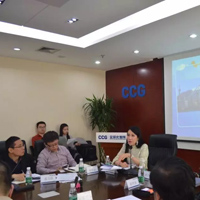
【China Daily】Panel explores globalization of Chinese film
A symposium focalizing on the globalization of the Chinese movie industry was held on April 10 by the Center for China and Globalization (CCG), a leading Chinese independent think tank dedicated to the study of Chinese public policy and globalization.A panel of experts from cultural industries and CCG representatives were brought together for the event, to fully examine the success of the Hollywood movie industry and draw parallels and contrasts with the current internationalization of China’s cultural industries.The symposium opened with a feature presentation given by Chui-Ti Jansen (Liu Qiudi), CCG senior non-resident fellow, founder of the multimedia platform China Happenings and columnist for the Financial Times. Liu’s speech tracked the historical development of Hollywood and its close links to the growth of US influence, showing the global shift of economic power also plays a significant role in this relationship.Liu also emphasized the important role of movie talent that migrated to California from around the world in the inter-war period and the importance the US government attached to market access for Hollywood movie exports.Picking up on points raised in Liu’s speech, a panel of experts drew on their extensive experience in various cultural fields to share insights on Hollywood and implications for the internationalization of China’s growing movie industry.Lu Xingdong, a seasoned film producer, Chairman of Longs Cultural Industrial Investment Group, and senior council member of CCG, asserted a self-driven and effective film association is essential for China.Lu also pointed out the importance of comprehensive development and linkages across different segments of the movie industry to assure quality and profitability of movie productions.Gao Wei of the China Literature and Art Critics Association; Qu Jianping, founder and president of the CITIC Guoan International Film Production Base; Sun Jiashan, director of the Contemporary Art & Literature Criticism Center at the China National Academy of Arts; and Wang Qingyong, chairman of Ajimo Film Investment, also shared their opinions on how China can integrate its culture internationally.From China Daily,2018-4-13
2018年4月16日 -
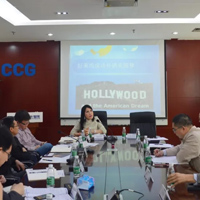
【People’s Daily Online】China’s cultural confidence encourages movie industry
As China eyes further opening up, the nation’s movie industry is expected to get yet another boost from the nation’s rising cultural confidence, experts said Tuesday.“China needs its own track to promote its movie industry with soft power. The pattern applied by Western countries can only be a reference,” Liu Chiu-ti, a New York-based Chinese publisher, at a forum hosted by the Center for China and Globalization (CCG) in Beijing on Tuesday.Liu, also a senior CCG fellow, mentioned that the rise in cultural confidence also gives China strength for “going out.”Aiming to develop its cultural industry into a pillar of the national economy by 2020, China has been endeavoring to advance the globalization of the industry on the right path.With fast expansion, China’s cultural industry had combined revenue of some $1.5 trillion in 2017, according to the National Bureau of Statistics.In regard to the movie industry specifically, China is now the second largest movie market in the world after the US. Between 2006 and 2016, the domestic box office has risen by 33.8% to $7.2 billion. Some 48 out of 89 movies that yielded more than 100 million yuan at the Chinese box office in 2016 were made in China.In 2018, Chinese anti-terrorism action film “Operation Red Sea” already topped the box office with over $531 million and became a blockbuster in the overseas market as well, earning an average rating of 7.7 out of 10 on IMDB and 8 on Rotten Tomato, two well-known movie review websites.Based on a real evacuation mission of PLA Navy, the story “brought in” Hollywood style in terms of production scale and technology, and “went out” with a Chinese story to spark patriotism with audiences of diverse backgrounds, experts at the forum pointed out.The success of “Operation Red Sea” globally will definitely give China more confidence to tell China’s story well in the international context, experts noted.China has been continuously injecting impetus to globalization by deepening overall reform and opening-up. Chinese President Xi Jinping renewed the call on Tuesday by vowing to break new ground in opening China further at the opening of the Boao Forum for Asia annual conference in Hainan province.From People’s Daily Online,2018-4-11
2018年4月16日 -
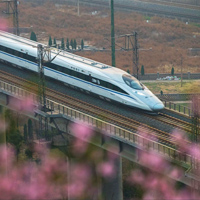
【China Daily】 Forging onward
A bullet train on the high-speed line near Jinan, Shandong province. Provided to China DailyLeaders at key forum focus on how China will continue momentum of reform and opening-upWhere next for China? How China moves forward to the next stage in its development after marking 40 years of reform and opening-up was the focus of one of the most important annual forums held in Beijing.Some of the world’s leading academics, including Nobel Prize winners, business leaders, thinkers and politicians, descended on the Diaoyutai State Guesthouse, which was basking in the spring sunshine, for the China Development Forum 2018, whose theme was "China in the New Era".The star-studded cast at this year’s event - held from March 24 to 26 - included Apple CEO Tim Cook, who was the co-chair, Google CEO Sundar Pichai, World Bank CEO Kristalina Georgieva and Pascal Lamy, the former director-general of the World Trade Organization.Also attending what is always the first State-level forum after China’s annual two sessions big political meeting were Premier Li Keqiang and Yi Gang, the newly appointed governor of the People’s Bank of China, who spoke about China’s further opening of its financial sector.The focus of many of the discussions, which took place at various venues across the guesthouse complex, was how China now moves on from reform and opening-up - launched by Deng Xiaoping in 1978 and which has since lifted 700 million people out of poverty - to its new era, which will involve a new set of challenges.Key topics included transitioning to high-quality growth, supply-side structural reform, further opening up on all fronts, and China’s ambition to be a global technology leader with success in such areas as artificial intelligence, robotics, advanced manufacturing and green technology.Stephen Roach, a senior fellow at the Jackson Institute for Global Affairs at Yale University, who was attending his 18th forum and who spoke on a panel about China’s reform and opening-up, says the last 40 years were a remarkable period."No large developing economy has ever done what China has done over this period, transforming itself into the world’s most powerful export machine," he says."It was greatly helped by joining the World Trade Organization in 2001, which proved just the right time, because it was a critical inflexion point in the global trade cycle. Global trade had been flat until that time, and then it suddenly exploded and China rode this amazing curve at just the right time," he says.Roach, a former Asia chairman and chief economist for investment bank Morgan Stanley, says the major challenge for China in its new era will be dealing with the "principal contradiction" that General Secretary Xi Jinping highlighted in his report to the 19th National Congress of the Communist Party of China in October."The broad framework of the principal contradiction is about thinking about China getting from where it is today to meet the new era goals while reconciling unbalanced and inadequate growth and the growing needs of the people," he says.Ian Goldin, a professor of globalization and development at Oxford University and a former economic adviser to the late South African president Nelson Mandela, spoke at a discussion on China and the world in 2050.He believes China will face fewer domestic challenges in the new era than it did in the 40 years since reform and opening-up."It is less of a challenge because society has become more sophisticated, with people more educated, and there is much more knowledge around. Some of the toughest issues like eliminating most of the extreme poverty have been overcome, so I think domestically it will become more manageable."Goldin, who first came to China in 1982, said both China and the world will look very different by midcentury, when China has set the target for becoming a modern socialist country in every respect in time for the 100th anniversary in 2049 of the founding of the People’s Republic of China.By then, he forecasts, emerging markets will represent 80 percent of global GDP, up from just over 50 percent today.Chinese will be four times richer, with per capita income of around $35,000 (28,500 euros; £24,860), compared with $8,123 in 2016, according to the World Bank.China’s population will still be 1.3 billion, with the population falling everywhere else in the world but Africa.Average life expectancy in China will be 84.4 years - eight years more than today - and people will be working into their 70s and 80s.Goldin says that although the domestic environment in China might be more benign, there will be more global threats, many of them new."There is much greater risk of external shocks. There are global common issues such as climate change, pandemics, cyberattacks and such things as antibiotic resistance," he says."The threats don’t exist in their own silos anymore. The next financial crisis could be caused by a pandemic, a cyberattack or a climate event rather than something just restricted to finance."Jing Ulrich, the Hong Kong-based Asia-Pacific managing director for investment bank J.P. Morgan, believes China will build on the last 40 years of reform and opening-up and continue to reform in the new era."China’s economy and financial sector have been reforming and opening up for over 40 years, and I don’t think any external event could reverse these trends," she says."The Chinese government has pledged to further open its economy, liberalizing some sectors and allowing greater foreign ownership in others to make the economy much more market-orientated," she adds.Roland Berger, founder and honorary chairman of international strategy consultants Roland Berger, says China has confounded all forecasts since reform and opening-up began, so it is difficult to predict what will happen next."I have been coming to China as a consultant since 1983, so I know the country. China has always been good for surprises. People in the past have been skeptical, but China has published its five-year plans and fulfilled most of the promises in them. They have also done all this without a major crisis, whereas the West has had a very serious financial crisis 10 years ago."However, Berger, who has also been a regular forum attendee, is concerned about the state having too much of a role and believes China needs to stick with its policy of introducing market reforms."If they do that, I don’t see any reason why they should not fulfill their intentions, for example, with their Made in China 2025 strategy of becoming a leader in technologies such as artificial intelligence and robotics."Roach at Yale University says China will also have to wrestle with a subset of contradictions if it is to achieve its key goals in the new era."There are four I would highlight. First, that between demand and supply in the economy. Although the emphasis is currently on supply-side reform, there also needs to be reform of the demand side of the equation, too, so as to boost consumption. Second, there is a contradiction between state versus market ownership. There needs to be much more aggressive State-owned enterprise reform. Third, achieving a trade-off between growth and financial stability. And then, fourth, there needs to be more of a distinction between the path and the destination. The emphasis should be on the route to achieve the goals and not just on the destination itself." Sir Mark Moody-Stuart, former chairman of Anglo-Dutch giant Royal Dutch Shell and now chairman of the United Nations Foundation for the Global Compact, which aims to encourage sustainable practices among corporations worldwide, believes that reform and opening-up has been an "astonishing achievement" and a role model for other developing countries, particularly those in Africa."The way China has done this is an example to other parts of the world. Having visited some poverty-reduction eradication programs in China, you realize the importance of the emphasis on communications and physical infrastructure. You cannot lift people out of poverty unless they are connected to the market," he says.Moody-Stuart says China’s approach to development is already making Western foreign aid organizations rethink their approach to development."China’s investment in Africa has very much focused on infrastructure, and it has encouraged foreign aid organizations to move away from getting governments to focus on budget reform or programs on education to concentrate on infrastructure. The World Bank and others are now cooperating with China on such projects."Wang Huiyao, founder and president of the Center for China and Globalization, a Beijing-based independent think tank, believes China is at a crossroads between its hardware and software phases as it moves into its new era."In the last 40 years, in terms of hardware, we have achieved a lot with all the infrastructure and high-rise buildings. The next 40 years, though, is going to be more about software, including institutions building, establishing greater rule of law, legal governance, more efficient government, tax reform and a range of issues like that."The forum, which was the 19th since the event was inaugurated in 2000, once again demonstrated the quality and level of debate that exists in China about the future direction of the world."There is no equivalent to this forum in the world," said Apple CEO Cook at the conclusion of his address to the final session.Moody-Stuart hopes China in the new era will translate some of the ideas that it generates within forums such as the China Development Forum into more global leadership coming from Beijing."China is now in a position as a major nation to demonstrate leadership," he says."If this could be done in the same way as it has achieved things internally, it would be a great gift to the world. The world is a bit short of leadership at the moment."From China Daily,2018-4-8
2018年4月16日 -
CCG深圳理事交流会: 砥砺四十载 聚力再出发
继全球化智库(CCG)上海分会和香港委员会先后举办主题为 “区块链与人工智能”的理事交流会和“粤港澳大湾区发展战略与香港国际都市定位”的座谈会,CCG深圳分会前日在深圳九号红茶庄园举办理事交流会。茶香氤氲迎八方来客,CCG副主席、常务理事、理事以及知名企业家、创业创新翘楚、跨国公司高管等近50余位官产学各界精英前来共襄盛会。 全球化智库(CCG)理事长、欧美同学会副会长王辉耀博士首先向来宾致辞,对一直以来关心和支持CCG智库建设的各位嘉宾表示衷心的感谢。王辉耀博士表示,站在改革开放40周年的新起点,深圳作为改革开放的排头兵、先行地、实验区,同时作为粤港澳大湾区重要城市,需要更多软实力的建设和思想的百花齐放,要以更开放的姿态迎接未来的机遇与挑战。希望未来可以与在座的各位精英一起更好地推动智库在深圳的建设,更好地为深圳乃至中国的全球化发展建言。 南科大清洁能源研究院院长、国家千人计划联谊会副会长、CCG常务理事兼深圳分会会长刘科院士回溯了CCG成立契机,源自于一群有国际视野、热心公益精英海归的使命感。他指出CCG历经十年打造,已发展为中国推动全球化的标杆智库。未来十年,CCG将坚持“用全球视野,为中国建言;以世界眼光,为中国献策”,充分发挥中国智慧,深入研究推动全球化发展,打造国际合作新平台,增添共同发展新动力,将中国企业带向世界。 全球化智库(CCG)秘书长苗绿博士介绍了CCG的定位和社会影响力,CCG成立十年来一直致力于国际人才竞争力体系和移民相关研究,对组建国家移民管理局持续建言和呼吁,今年这一政策推动的重大成果得以实现,对世界格局和中国发展将带来重大改变和深远意义。CCG如今取得的成绩离不开背后近两百位来自金融、制造、贸易、文化等多种产业领域的中国知名企业家的支持。CCG未来将与各位企业家精英共同为中国更高层次的对外开放建言献策,推动新一轮改革开放,共谋全球化战略。 深圳市海云天投资控股集团董事会主席,CCG深圳分会副会长游忠惠女士和深创学院创始人宝石结合切身体验,讲述了与CCG的渊源和对智库发展的见解,表示此次交流会不仅为社会各界精英人士搭建了友谊桥梁,同时也搭建了一个发出深圳声音、贡献地方智慧的高端平台。同时就CCG深圳分会未来的发展提出了很多宝贵建议,纷纷表示愿意尽力支持CCG在深圳开展工作。 我国已成为具有全球影响力的世界大国,迫切需要一批能与国际智库直接对话的新型智库,服务国家开放战略。深圳不仅是国际化城市,更是我国对外开放的窗口,肩负着国家开放发展的探路先锋重任,亟需国际化的智库提供智力支撑。CCG作为中国领先的社会智库,致力于中国的全球化战略、人才国际化和企业国际化等领域的研究,秉承“国际化、影响力、建设性”的专业定位,坚持“用全球视野,为中国建言;以世界眼光,为中国献策”。2018年,CCG将迎来成立十周年。CCG将不忘成立初心,铭记国际化智库在新时期的历史使命满怀豪情继续努力,为中国推动全球化和全球治理贡献更好的智库研究成果,促进国际社会在新时代中达到更加开放发展、合作共赢的新境界。 出席本次会议的CCG常务理事还有TCL集团副总裁、TCL文化传媒公司董事长、TCL公益基金会执行理事长、CCG深圳分会副会长魏雪,长荣控股集团(香港)股份有限公司董事长陈耿彬,深圳市分享成长投资管理有限公司管理合伙人段苏函,深圳道朴资本管理有限公司董事长王红欣,达仁投资管理集团股份有限公司董事长王伟东,北京财讯投资管理有限公司董事总经理谢暄辉,深圳市多和美投资顾问有限公司董事长张益凡;CCG理事杭州若比邻机器人科技有限公司CEO邱宇峰、安学国际有限公司创始人、总裁徐耀良。 出席嘉宾还有东呈集团国际事业部副总裁陈静,灵宝黄金股份有限公司董事长陈建正,金服创始人兼CEO陈九,广东微家企业管理有限公司总经理陈伟全,原壹比特创始人虫哥,深创学院创始人宝石,珠海市众大建筑有限公司总经理黄凯彬,岭南集团主席李诚康,深圳凡尔纳控股有限公司董事长李鉴洲,前海南方金融控股集团有限公司董事长刘加友,佳兆业科技集团总裁陆有源,华联世纪生物工程股份有限公司董事长罗卫城,深圳市大数据产业发展促进会创会副会长兼秘书长彭向阳,顺视科技容天顺,中山会(深圳)创业投资有限公司总经理孙钜黄,欧美同学会企业家联谊会理事仝小民,南方科技大学教育基金会秘书长涂蓉辉,普济资本深圳合伙人王卉,深创学院合伙人王雪玓,Vision Max董事总经理夏悦,佳兆业集团控股有限公司副总裁邢涛,聚点资本创始合伙人杨小白,国采金控董事长、优派能源董事局主席张利,华联世纪生物工程股份有限公司副总裁张强,达仁集团执委会轮值主席赵龙,福田区政协副主席朱东波,CCG南方国际人才研究院合作部总监刘晓灿。特别鸣谢深创学院和九号红茶庄园为智库交流会提供支持。 全球化智库(Center for China and Globalization),简称CCG,是国内最大的社会智库型研究机构。CCG成立于2008年,总部位于北京,在国内外有近10个分支机构或海外代表处,“以全球视野为中国建言,以中国智慧为全球献策”,致力于中国的全球化战略、人才国际化和企业国际化等领域的研究。2016年CCG成立了深圳分会、上海分会,2017年成立了香港委员会,定向邀请了有国际视野、热心公益和富有使命感的知名企业家担任CCG 咨询委员会副主席和常务理事,邀请了一批有社会责任感的精英人士担任CGG理事。目前CCG拥有近两百位社会精英理事组成咨询委员会,围绕“中国与全球化”的重大话题,包括国内外重大政策变化、国际发展趋势、全球市场热点、行业最新创新等,CCG会定期邀请政府决策层、业界精英、知名学者或行业领袖等,进行主题演讲、圆桌交流和相互碰撞,探讨中国在国际化过程中的机遇、挑战,为中国和全球化发展出谋划策,同时邀请主流媒体进行深度报道。CCG将在会前对近期热点进行梳理概述,会后将针对交流会形成的有建设性的思想进行总结,形成建言献策,上报国家有关部委,推动政策建议。本次CCG深圳分会理事交流会的举办旨在不断拓展渠道,加强深圳理事和社会各界精英人士之间的合作与交流,有效对接社会各界资源,为中国企业的全球化和国际化做出CCG深圳分会的贡献。
2018年4月16日 -
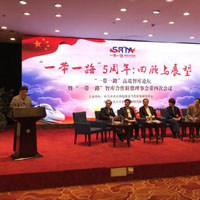
【光明日报】智慧激荡新时代 “一带一路”再出发
4月3日,由中共中央对外联络部当代世界研究中心、中国人民大学重阳金融研究院共同主办的“一带一路”高端智库论坛暨“一带一路”智库合作联盟理事会第四次会议在京举行。 中共中央对外联络部副部长、“一带一路”智库合作联盟共同理事长郭业洲在致辞中强调,习近平总书记提出的“一带一路”国际合作倡议,是促进中国与世界共同繁荣发展的重要创举,是推动构建人类命运共同体的伟大实践。五年来,“一带一路”取得了多方面重要成就,为推动世界经济发展和沿线国家民生改善发挥了积极作用。“一带一路”智库合作联盟成立三年来发挥了深化政策沟通、增进民心相通、推动务实合作等重要功能,已经成为“一带一路”建设中的重要力量。 以智库建设为着力点,为推动民心相通贡献力量 大学在推进“一带一路”建设中发挥着不可替代的作用。复旦大学党委书记、“一带一路”智库合作联盟共同理事长焦扬认为,新时代要继续发挥高校的学科优势、人才优势、智力优势和对外交往优势,不断为提升“一带一路”建设水平贡献力量,打好“理论研究、人才培养、人文交流、平台建设”四大攻坚战。 北京师范大学校长董奇认为,全国高校应发挥各自优势,聚焦人才培养和信息传播,明确站位、牢记使命、做好规划、突出特色,促进“一带一路”沿线国家青年互动交流,为推动民心相通作出更大贡献。 天津外国语大学副校长余江介绍了依托孔子学院进行“一带一路”公共外交的实践经验并指出,做好新时代“一带一路”上的传播交流,应着力激发孔子学院开展公共外交的内生动力,培养中方人员公共外交意识,通过搭建海外智库,加强国际学术交流,吸引亲华友华知华的专家学者,更好传播“一带一路”的理念和价值。 十二届全国人大外事委员会副主任委员、蓝迪国际智库专家委员会主席赵白鸽指出,未来“一带一路”建设要坚持需求导向、项目导向、结果导向,通过“一带一路”培育新的世界经济增长点,推动全球治理结构改善。 “共商共建才能共享共进。”上海国际问题研究院学术委员会主任杨洁勉认为,“一带一路”的建设与研究,都要充分考虑沿线国家的需要与感受,在维护共同利益的基础上稳步推进。 机制化建设,为“一带一路”行稳致远保驾护航 中国国际经济交流中心副理事长、“一带一路”智库合作联盟共同理事长魏建国强调,各类智库应该在“出招、解惑、指路”方面发挥作用,为海外工业园建设、企业“走出去”等提供智力和行动支持。他表示,随着一大批工业园的建立,中国“走出去”的企业将形成广泛散布的、闪光的明珠。要以此激励民营企业的积极性,积极展示中国道路、中国发展的标志性成就。 全球化智库(CCG)理事长、国务院参事王辉耀认为,截至目前,“一带一路”倡议的机制化程度还较低,缺少稳定的专门机构和制度安排。他建议,在各国轮流举办“一带一路”智库年会,各国智库定期聚在一起讨论“一带一路”相关议程,就政策、经贸、基础设施、人文、金融等领域的合作开展广泛交流和协商,并通过协议、规划、机制、项目等方式,共同推进“一带一路”在各个阶段循序发展。 中国社会科学院亚太与全球战略研究院院长李向阳认为,“一带一路”机制化建设要秉承正确的义利观,遵循共商共建共享原则和渐进性原则,唯有如此,才能顺利推进。 财政部国际财经中心主任周强武围绕“一带一路”建设当中的“资金融通”,提出要充分发挥市场的作用,进一步丰富和充实现有的成果体系,秉持开放包容、共享共建、合作共赢的理念,探索构建一个稳定、可持续、风险可控的多元化投融资体系。 为“一带一路”建设提供更精准的智力支持 “一带一路”已经成为倡导和发展国际关系新理念、新规范、新模式的重要平台,共商共建共享的全球治理理念在“一带一路”国际合作中得到实践和推广。 郭业洲表示,下一阶段智库联盟要重点做好四个方面工作:做好“一带一路”建设的研究与传播;努力打造“一带一路”高端智库对话平台;积极探索以“智库+”模式大力推动政策沟通和务实合作;努力讲好新时代“丝路故事”。未来在推进“一带一路”建设过程中,要充分发挥成员智库“思想源”“政策源”“舆论源”“信息源”优势,全力打造“一带一路”的“智库聚集地”“信息枢纽站”“合作助推器”,为构建人类命运共同体、建设更加美好的世界作出新的贡献。 推进“一带一路”建设工作领导小组办公室丝绸之路经济带协调推进组组长、国家发展与改革委西部开发司巡视员肖渭明指出,推进“一带一路”建设,未来要在加强基础设施互联互通、提升经贸合作水平、创新金融产品和服务、深化人文交流合作、加快保障体系建设五个方面加强国际合作。要更加注重发挥智库作用,创新“一带一路”智库合作新模式,切实服务“一带一路”建设进程。 中联部当代世界研究中心主任、“一带一路”智库合作联盟秘书长金鑫表示,智库联盟下一步的工作设想可以概括为“五个一批”:办好一批研讨会;完成好一批课题;写好一批调研报告;出版一批著作;支持和培养一批人才。“我们期待通过这样的全方位努力,为‘一带一路’建设提供更精准的智力支持。”金鑫说。文章选自光明日报,2018年4月11日
2018年4月13日 -
改革开放40周年——第五代海归领军者张亚勤:科技改变中国地位
张亚勤,全球化智库(CCG)常务理事、百度总裁当年在美国有着令人羡慕的工作的张亚勤,果断决定放弃美国已经有的一切,回国“创业”,他的决定在后来带动一大批海外科学家加入回国的大潮中。很庆幸,中国这翻天覆地的变化中,作为第五代海归的领军人物,张亚勤真的成为了历史的创造者之一。“这已经是我第15次参加博鳌会议了。最开始我来的时候还挺年轻的。当然,经过了这段时间之后,我也亲眼见证到了中国经济的发展和中国高新技术行业的发展。”4月9日出现在博鳌论坛的百度总裁张亚勤,感慨这15年见证中国经济的高速发展。其实,他内心更加感慨的是,从他1978年以12岁的年龄考入中国科技大学少年班的时候开始,到今天整整四十年,他见证了整个中国改革开放的历程,并成为其中创造历史的一份子。这个世界的奇妙就在于,你无法说清楚是一代人改变了世界的走向,还是世界的走向决定了一代人的命运。张亚勤,四十年前成为中国恢复高考后第一代的受益者。但今天再回望,这一代受益者正在用他们的智慧改变着中国社会经济的走向。在博鳌的“新一轮技术革命”论坛中,张亚勤认为未来五到十年,“我们会更多地讨论人工智能、无人驾驶、量子计算,以及一些新的架构、新的应用,甚至是一些全新的元素来实现计算。”一个国家科技水平决定一个国家的综合实力。在博鳌论坛期间,张亚勤接受央视财经专访时表示,在科学技术方面,40年前中国的科技在计算机行业基本上不存在,过去20年,中国进入到移动互联时代,中国的部分产品已经比美国好,未来40年,中国在高科技方面一定会处于领先,可能和美国成为双引擎。经过几代人的努力,今天,当面对人工智能、量子计算、无人驾驶等未来技术的时候,中国已经不落后了。而这正是以张亚勤为代表的一批中国籍世界级的科学家给中国带来的变化。神童开卦的人生1977年,本该小学毕业年纪的张亚勤已经跳级到初三。一天,他的班主任拿着一份报纸给他看:13岁的宁铂考上了中国科技大学。那时候,中国刚刚恢复高考不久,全国正在兴起读书的热潮,国家也花大力气培养各方面的人才。宁铂的故事刺激到张亚勤,当时在同学中就已经被称为“神童”的他,似乎突然有了新的目标:中科大少年班。随后7个多月的时间,他每天近20个小时的学习,在来年的高考中一举考入中国科技大学少年班。12岁上大学,打破了宁铂的纪录,成为中科大最年轻的大学生。1978年,刚刚改革开放的中国,全社会都非常尊重知识、尊重人才,中科大的这一群“少年天才”更是时代的“宠儿”。12岁的张亚勤个子小小的,胸前挂着中科大的胸牌去坐公交车,售票员马上就知道这应该是中科大的“小天才”,非常友好地免掉了他的车票。考上中科大的张亚勤,当时感触最深的就是整个社会的变化,而中科大这批孩子似乎代表着一种新时代的精神:崇尚知识。在随后的很多年里,社会上都流传着“知识改变命运”的思潮。张亚勤的幸运,不仅在于他有超常的记忆力,更是四十年前改革开放使得整个社会的走向发生了变化,他才有机会将自己超于常人的智商发挥出来。张亚勤是被知识改变命运的一员。1986年硕士毕业的张亚勤汇入了留学大潮当中。改革开放的中国,需要更多具有全球视野的人才,所以那个年代掀起留学热,有公派留学,有交换生,还有自己拼尽全力考出去的。23岁博士毕业,31岁成为IEEE最年轻的院士,38岁成为微软全球副总裁,进入微软决策层,成为比尔盖茨的智囊团核心成员……张亚勤从12岁起开卦的人生,并不是只因为他有着超常的智商,而是每一步同样都付出了超出常人的努力。从上中科大之后,他就忽略来自外界对他“神童”的评价,低调地在中科大学习成长。其实,无论多么聪明的人,成功取决于努力的程度和持续学习的能力,而不是天生的智商。创造一个实验室,也创造了一个历史当然,成功不仅取决于努力的程度,还取决于对时代脉搏的把握,也就是我们所说的“踩对了点”。一个关键的转拆点在1998年年底,张亚勤接到李开复的电话,邀请他一起回国创立微软中国研究院。李开复对他说:“我们不仅是创造一个实验室,也是创业,未来还会创造一个历史。”回国创业,对于张亚勤这一代留学生有着无穷的魅力,已经具备国际视野的他们当然清楚,中国将进入高速发展的轨道。他们可以在这条轨道上让自己的人生更精彩,也有能力帮助列车在轨道上跑得更快。张亚勤在出国留学的大潮中走出去了,又在回国创业的大潮中回到了中国,并且是这波回国潮的引领者。这批海归带动了中国新经济的高速成长,也让中国的技术在近二十年间里大大缩短了与美国的差距。1999年前后,除了张亚勤这一批科学家回国,还有一批像张朝阳这样的留学生回国。以张朝阳、李彦宏为代表的海归,将美国成功的互联网模式复制到中国,拉开了中国互联网轰轰烈烈的大幕,也把中国用户全面带入互联网时代。而以张亚勤、李开复为代表的一类科学家海归,则显得没有那么轰轰烈烈,他们带来的改变是潜移默化的,慢慢改变了中国科技研究的模式,培养了大批的本土人才,在下一个科技浪潮来临时,让中国与美国站在了同一个起点上。李开复当初跟张亚勤说“未来还会创造历史”的时候,可能没有想到他们这群人真的创造了历史。在微软前后,英特尔、惠普、IBM、思科等国际巨头,全部都在中国投入研发机构,大量海归回国。这其中,微软对于中国的研发机构投入决心最大,发展也最快,几年后便成为是微软在美国之外规模最大、功能最完备的研发基地。并于2004年,被MIT Technology Review评为全球最顶级的计算机科学研究院。在张亚勤任内,微软中国研究院升级为微软亚洲研究院,后又上升为微软亚洲研发集团,旗下微软亚洲研究院、微软亚洲工程院、微软亚洲互联网工程院、微软亚洲商务软件事业部、微软亚洲硬件技术中心、微软(中国)云计算和企业部门,战略合作部,覆盖基础研究、技术孵化、产品开发和战略合作等方面,已成为完整的创新链条。完备的研发机构以及人才培养机制,都为后来中国企业的创新起到了重要的作用。迄今为止,微软亚太研发集团拥有超过3000名杰出科学家和工程师,其中不乏全球顶级科学家,共培养了超过4800名的中国实习生。他们之中超过500名现在活跃在中国IT产业的各大企业,包括百度、腾讯、中国移动、阿里巴巴、联想等,100多人执教于中国一流大学,例如清华大学、北京大学、中国科技大学、中国科学院大学。在上个世纪90年代末期,中国科技业还在瞄准美国的操作系统、芯片等核心技术追赶。张亚勤这批海归带回来的研究项目是云计算、人工智能、虚拟现实、人脸识别等前沿技术的研究。后来事实证明,操作系统、芯片怎么追,都还是追赶的位势,没能成为中国优势。而那时候看上去还不知道有什么用的云计算、人工智能、虚拟现实、人脸识别等,已经让中国在全球处于领先地位。张亚勤在领导微软亚洲研发集团的时候,提出了“中国智造 慧及世界”的说法,那时候,随着中国科技人才的丰富和实力不断提升,中国正在从制造鞋子、拉链等小商品的时代,开始向制造世界领先的技术、顶尖的论文,并开始批量产生世界级科学家。其实,各个跨国巨头在中国建立的研发机构,不仅将大批华人科学家吸引回国,更拉动了中国本土人才的成长。当然,由于微软投入力度最大,并且在张亚勤等领导者对科学执着的追求下,这里培养了最多的人才。后来,微软亚洲研发集团也被称为中国创业者的“黄埔军校”,大量的人才从这里走出,在新兴的创业领域成为引领者。探索更广阔的未来2010年前后,外企在中国企业界的地位开始下降,不再享受到特别的“优待”,大量的外企人员开始向中国本土的互联网公司流动。这其中,各大跨国公司在华研发机构的科学家,开始进入BAT或是风口的创业公司。比如2010年成立的小米公司,其总裁林斌来自微软亚洲研发集团,早期员工中有数十人来自微软。再比如阿里云的掌门人王坚,凭借其在微软的积累开创了阿里的公有云业务。再比如,中国最有名的两个AI领域的创业公司----商汤和旷视科技,两家公司的创始团队都来自于微软。张亚勤于2014年离开微软加盟百度,出任总裁,被赋予“新业务掌门人”的职责,帮助百度拓展新业务的技术边界。作为世界级的科学家,这样的角色特别适合张亚勤。在BAT三大巨头中,马云是一个商人,马化腾是一个产品经理,李彦宏更像一个工程师,他想把百度打造成全球创新中心。今天的百度已经聚焦未来技术的至高点,云计算,AI,无人驾驶,量子计算,这些更决定企业未来的命运。张亚勤负责百度新业务的技术边界,也就是说要用他科学家的智慧,去拓展百度更广阔的未来。记得懂懂2006年采访张亚勤的时候,全球对云计算这个概念还朦朦胧胧,张亚勤博士就云计算发展的战略和重要性,发表了多篇文章。他积极呼吁中国建立自己的云计算和大数据发展战略,并在2010年两会期间,作为11届政协海外代表提交了“应及早制定和部署国家云计算战略”的提案。在百度执掌百度云业务之后,他又创造性地提出了“ABC”概念,即AI(人工智能)、Big Data(大数据)和Cloud Computing(云计算)三位一体,孤立的一个A或是一个B、C都没有价值,只有三位一体才能实现真正的AI。他认为,未来五年,这三大业务领域都有可能诞生超过百亿规模的新业务。在博鳌论坛期间,张亚勤接受央视财经专访时说到,“有了云之后,可以加速整个企业的部署,而老百姓使用的一些功能不是直接从云提供的,可以通过企业提供,比如车联网公司可以用云平台,把这些服务提供给用户。”在他喊出”ABC”的说法之后,很快这个理念就得到了整个产业的认同,“ABC”从百度一家公司的云战略,成为所有云计算企业的战略。这一次,百度走在了最前面。在《麻省理工科技评论》评出的2016全球最聪明的50家公司中,百度排名第二,将谷歌甩在身后。这一评选的标准不是市值或品牌信众的数量,而是“拥有真正的创新技术,以及实用又野心勃勃的商业模式”。不得不说,百度被评为“最聪明的公司”,这也是中国整体科技实力提升的最佳证明。懂懂笔记相信,一个国家的科技水平决定一个国家的综合实力,而一个企业的科技水平,将决定一家公司可以走多远。百度在技术创新方面的投入,以及将张亚勤这样一批世界顶级科学家纳入麾下,或将帮助百度在后半程发力。前不久百度宣布成立量子计算研究所,开展量子计算软件和信息技术应用业务研究,计划在五年内跻身世界一流,并逐步将量子计算融入到业务中。今天,很多企业没有能力也没有精力投入研究量子计算,但这却是决定未来的关键技术:一种从根本上增强计算能力的思路,其核心优势是可以进行高速并行计算。而量子计算可以克服速度与成本问题,将是迈向强人工智能的重要道路。也就是说,量子计算是未来一切技术的基础。作为基础技术,只有有技术实力、经济实力并且有一定前瞻性的公司才会全力投入。谷歌、IBM都在这个领域砸下重金,微软更是将量子计算与混合现实、人工智能并行定为公司未来三大发展方向。在中国,百度算是在互联网企业中最积极投入量子计算并且押宝未来的一家,这当然跟百度是一家科技基因的公司分不开,也跟百度未来定位人工智能战略分不开。在博鳌的“新一轮技术革命”论坛中,张亚勤表示,量子计算是令人非常兴奋的前沿技术,有很多新的发展空间。无论是张亚勤亲自操盘的公有云,还是面向未来布局的量子计算,中国企业在下一代技术创新方面,已经走在世界的前沿。【结束语】改变中国社会靠的是方方面面的人才,而张亚勤这一批海归科学家,是用近二十年时间改变中国科技实力的一群人,被称为中国第五代海归。近现代中国留学归国人员可分为五代,我们发现每一代海归都带回来不一样的东西,并从不同的纬度推动了中国社会的变化。清朝时期,以容闳、詹天佑、茅以升为代表的第一代海归,成为推动中国近代化的洋务运动的主力;清末至民国初期,周恩来、邓小平、李富春、陈毅等政治家、军事家留学日本、欧洲、苏俄等地,成为第二代海归,属于“留学救国”的一代;新中国成立前,以钱学森、钱伟长、钱三强、邓稼先等为代表的第三代海归,主要从欧美留学回来,许多人成为声名卓著的科学家、教育家、艺术家,成为新中国社会发展与国力提升的栋梁;新中国建设时期,中国向前苏联,以及东欧等地区的20多个国家派出了1万余名留学生,主要在国外学习工程技术和实用科学,回国后都成为20世纪五六十年代建设新中国的中坚力量,这是第四代海归;改革开放后,出国留学走向多措并举,留学生遍布世界100多个国家和地区。第五代海归有着多重文化熏陶、国际性人脉和资源、全球化视野、创新意识和创业意愿等,是全新的国际化人才群体。而这群人的回归,则真正扭转了中国科技长年落后的现状。每年都去博鳌的活动,或许每一年并感觉不到变化。当十五年下来再往回看,会看到惊人的变化。改革开放四十年也一样,一年比一年之间的变化就这样悄悄发生,但当回望四十年的变化时,每一个经历者都会为这种翻天覆地的变化而感叹。中国的发展从来都不是闭关锁国的,历史上每一次重大的变革与前进都与当时那一批海外留学人员带回来的思想、文化、技术息息相关。作为近代史上第五代海归领军人物的张亚勤,带回来的不仅是科学技术的一次里程碑式革新,也是经济发展的重大机遇。文章选自懂懂笔记,2018年4月10日
2018年4月13日 -
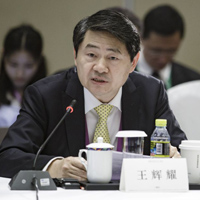
【CGTN】Expert: BRI needs global governance mechanism
At the opening ceremony of the Boao Forum for Asia annual conference, Chinese President Xi Jinping in his keynote speech vowed to "make the Belt and Road Initiative (BRI) the broadest platform for international cooperation." Since Xi envisioned this initiative in 2013, the BRI has gained momentous development yet is still confronted with brewing risks, which, if left unaddressed, will hinder its rosy development.CGTN Digital reporter Wang Xiaonan talked with Wang Huiyao (Wang), founder and president of the Center for China and Globalization (CCG), about the challenges facing the BRI, and what China can do to make the initiative a sustained cooperation framework. Wang gave a speech on the topic at the Boao Forum for Asia annual conference in Hainan.CGTN: The BRI has entered its fifth year. Over the past years, its unexpected progress has benefited a raft of developed and developing countries, but challenges remain, which may hamper its sustainable development and risk squandering previous efforts. What are the perennial risks and challenges?Wang: The primary risk is in the geopolitical conception. The BRI projects go through the most geopolitically complicated regions in the world. Plus, a number of countries involved have their unique political and economic environments and some of them have been mired in political turmoil or bitter wars.Then there are cultural and religious differences. A majority of the nations along the Belt and Road boast diversified civilizations and lack effective means of communication. If handled improperly, nationalist sentiments may rise from these divergences.Wang Huiyao speaks during a panel discussion of the Boao Forum for Asia annul conference in Qionghai, south China’s Hainan Province, April 9, 2018. /CCG PhotoCGTN: Certain countries are biased against the initiative, claiming that it’s all about China’s ambition to further its influence. In Western countries, there are also concerns that its projects lack transparency and aggravate the debt problems of certain nations. Xi articulated in his speech that "China has no geopolitical calculations, seeks no exclusionary blocs and imposes no business deals on others." What more could we do to prove that the BRI is based on reciprocity?Wang: Actually, what we need most now is a global governance organization for the BRI. So far, a large number of projects have been initiated by China. However, it lacks a common mechanism for all participants to engage in mutual consultation and joint construction to share benefits.Foreign entrepreneurs come to us to learn more about the BRI because they don’t know where to obtain information and launch cooperation with their Chinese counterparts.The organization could be a little loose-knit than the Secretariat of the Boao Forum for Asia, the Asian Infrastructure Investment Bank, or the council for the Organisation for Economic Co-operation and Development, but is expected to endow all participants with a sense of belonging. Its standing Secretariat should coordinate the development of the initiative as well as the relations among participants. A BRI charter could also be created to establish a partnership on an equal footing and mutual understanding, construct a just, fair security architecture, and promote exchanges among different civilizations.In addition, I think an international law commission and arbitration center for the BRI are in urgent need as well, in a bid to forge a new order of global governance surrounding this grand project. If most countries have to come to Beijing to seek a just verdict, then they will view China with colored spectacles and disputes will consequently ensue.With these mechanisms in place, the countries involved will be more proactive in co-building the massive infrastructure project with greater discourse of power. April 10, 2018: Boao Forum for Asia Convention Center in Boao Town, Qionghai, south China’s Hainan Province. /VCG PhotoCGTN: The trade row between the world’s two largest economies has rattled the world over recent weeks. It’s like we’re now living in a world of lopsided globalization, as the US and some major European economies are tilting toward trade protectionism and even populism. Facing a Western world tapering off on multilateralism, what more could we do to “make the BRI the broadest platform for international cooperation in keeping with the trend of economic globalization and to the greater benefit of all our peoples”?Wang: Multinationals play a pillar role in this case for they can influence government decisions. In the past years, plenty of the BRI projects have been decided by Chinese enterprises alone. Lacking knowledge about local laws and conventions, they could barely make the correct calculations in budgeting, designs, time constraints, among many factors.Transnational corporations can help set up a bridge between Chinese enterprises and local firms, banks, NGOs – to name a few – to facilitate feasibility studies. Financial centers like London, New York, Frankfurt, Tokyo and Singapore are home to not only established multinationals but also prestigious banks, fund management and security companies waiting to invest huge capital into new, reliable projects.If we can attract their investments in the BRI, I believe local governments will think twice before seeking to hinder its mutually beneficial projects.From CGTN,2018-4-11
2018年4月13日